Abstract
While a great deal of behavior analytic research has focussed on studying current contingencies, the amount of work done in the area of conditioning history is spotty, at best. Weiner (1964, 1969) conducted history research with human subjects, but little has followed in either the human or the nonhuman literature. Some direction can also be found in the literature studying the effects of conditioning on drug effects (e.g., Barrett, 1977; Urbain, Poling, Millam, & Thompson, 1978). However, “behavioral history” or “conditioning history” has not been a fully-developed area within behavior analysis. It is suggested that empirical work on history effects might have implications for (a) better understanding human-nonhuman behavioral differences and similarities, (b) clinical applications, especially where clients are resistant to behavioral change, and (c) theoretical assumptions in behavior analysis in relation to both basic and applied concerns.
Keywords: conditioning history, behavioral persistence, reinforcement schedules, continuity theory, behavior analytic theory, human-nonhuman differences, clinical applications, behavioral variability
Full text
PDF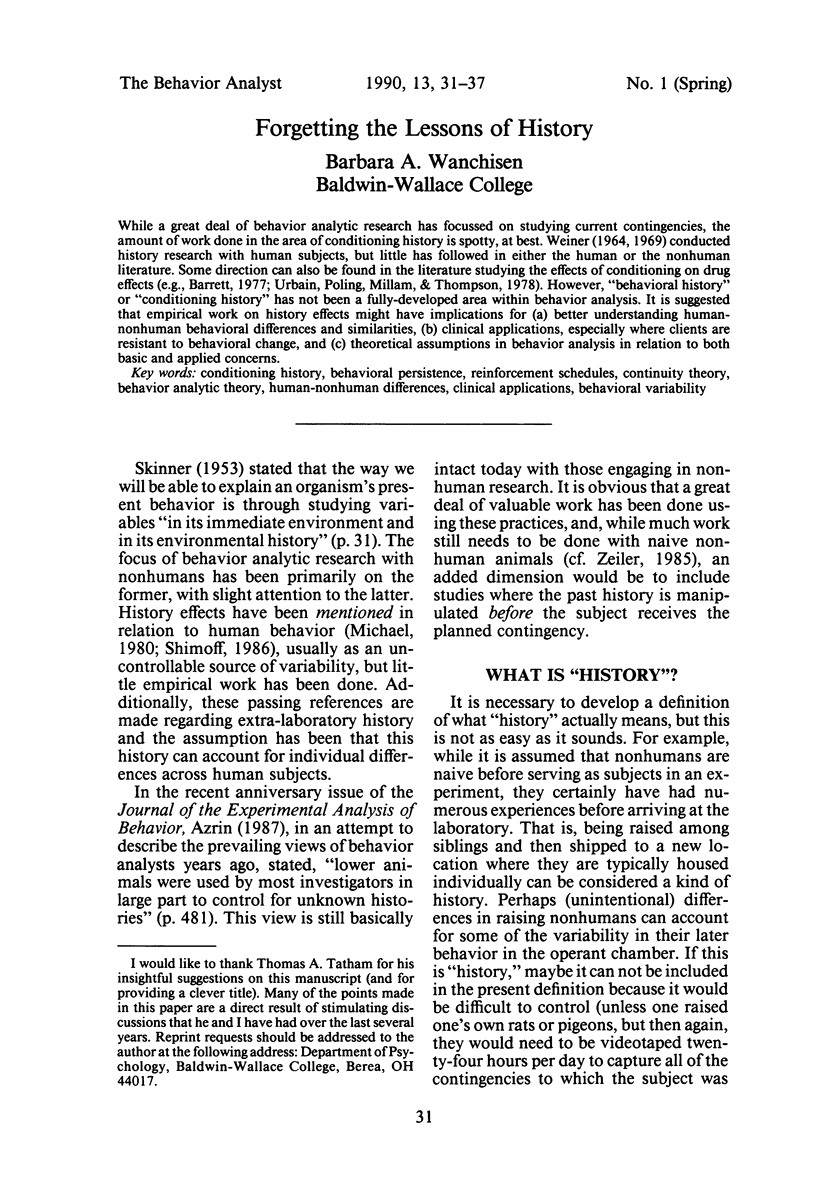
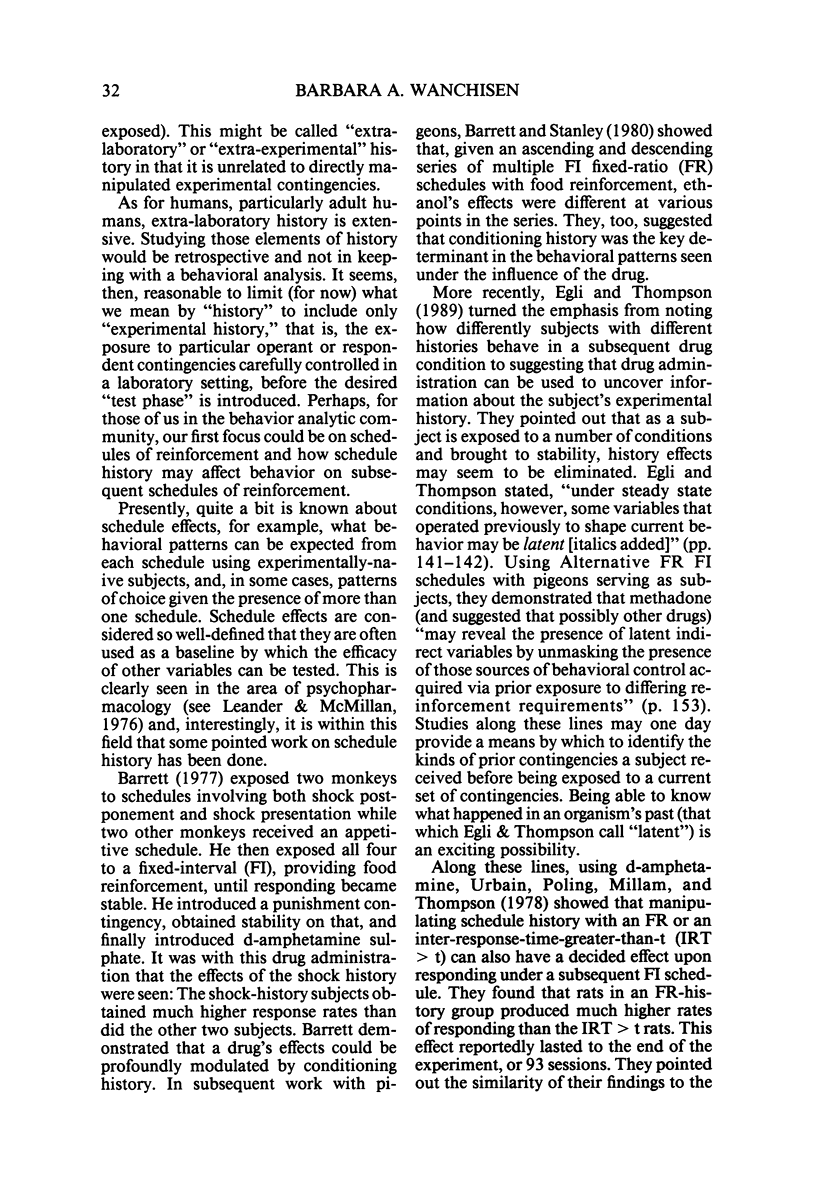
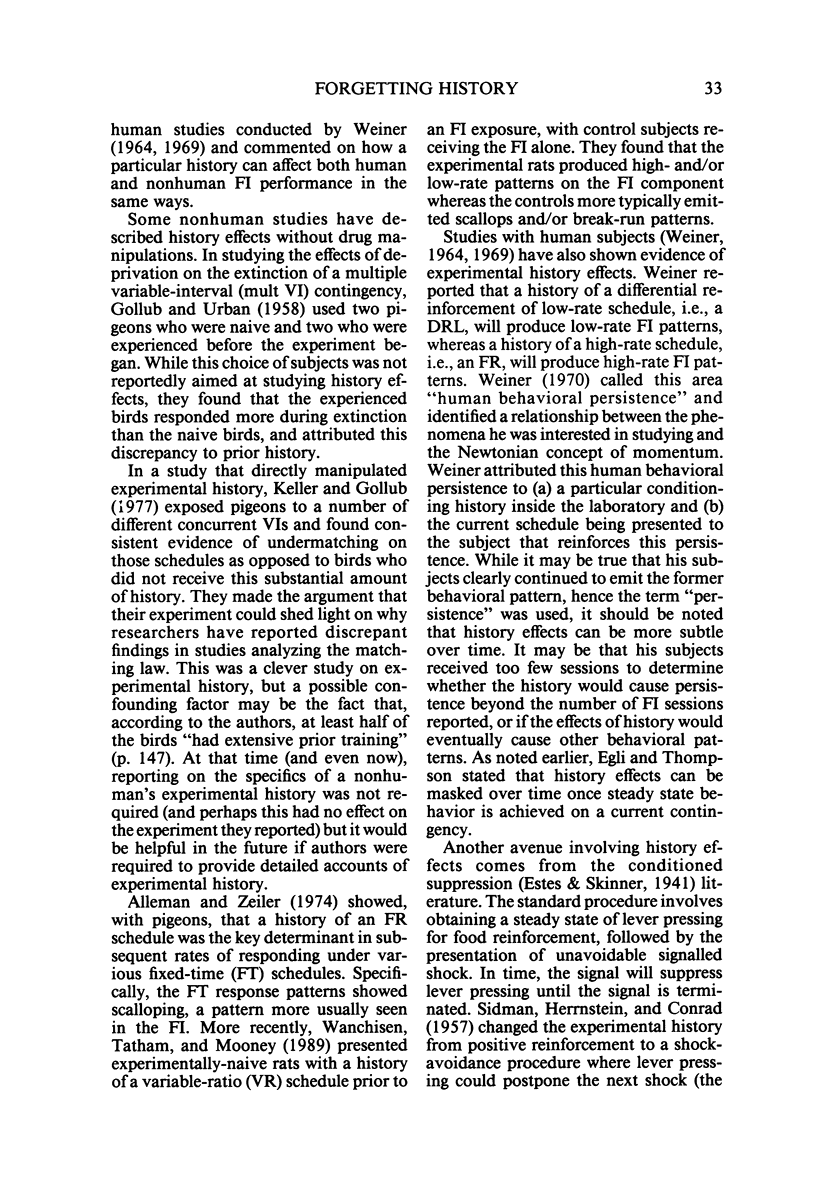
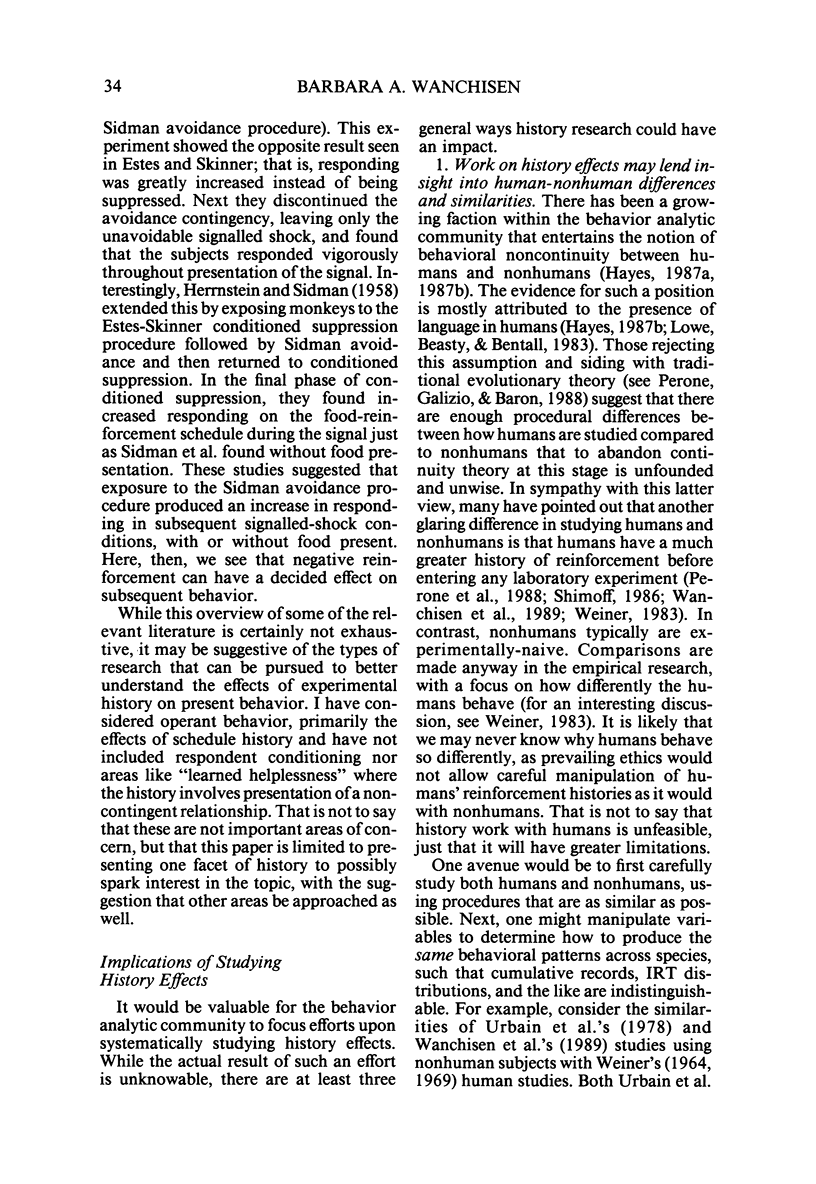
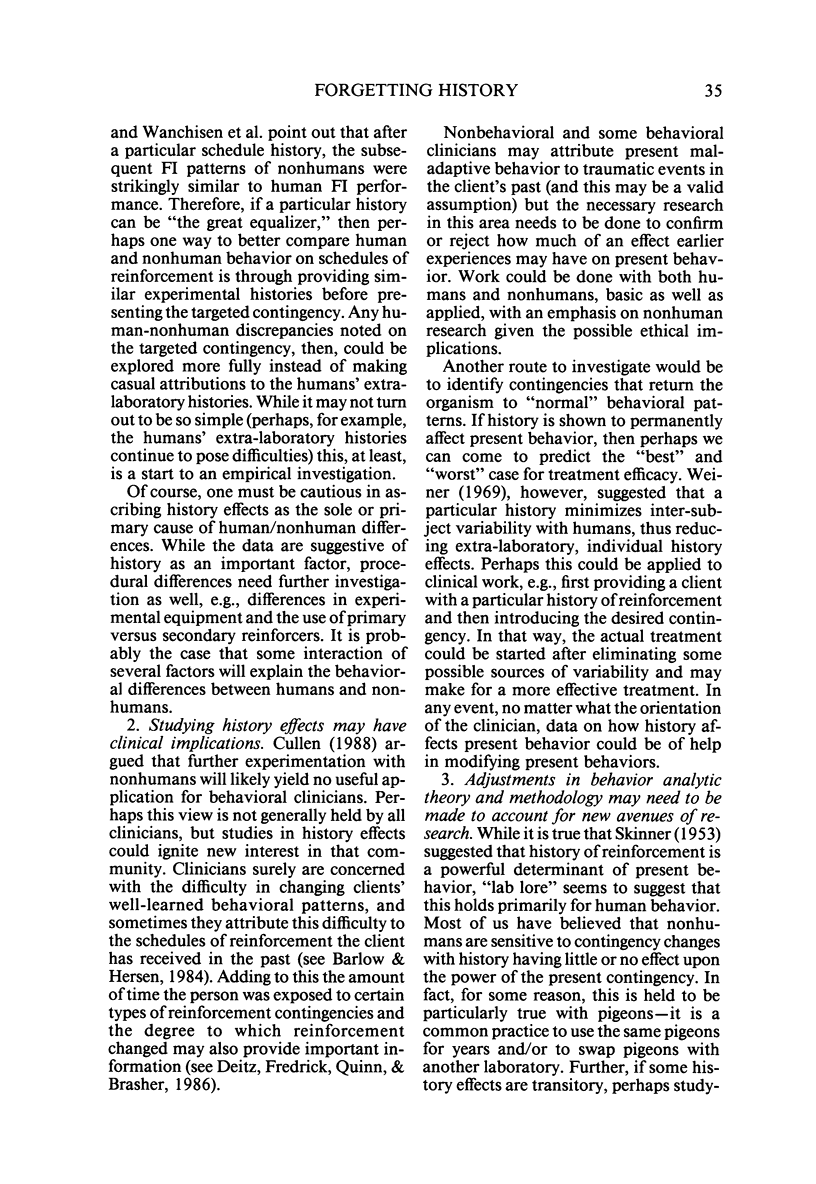
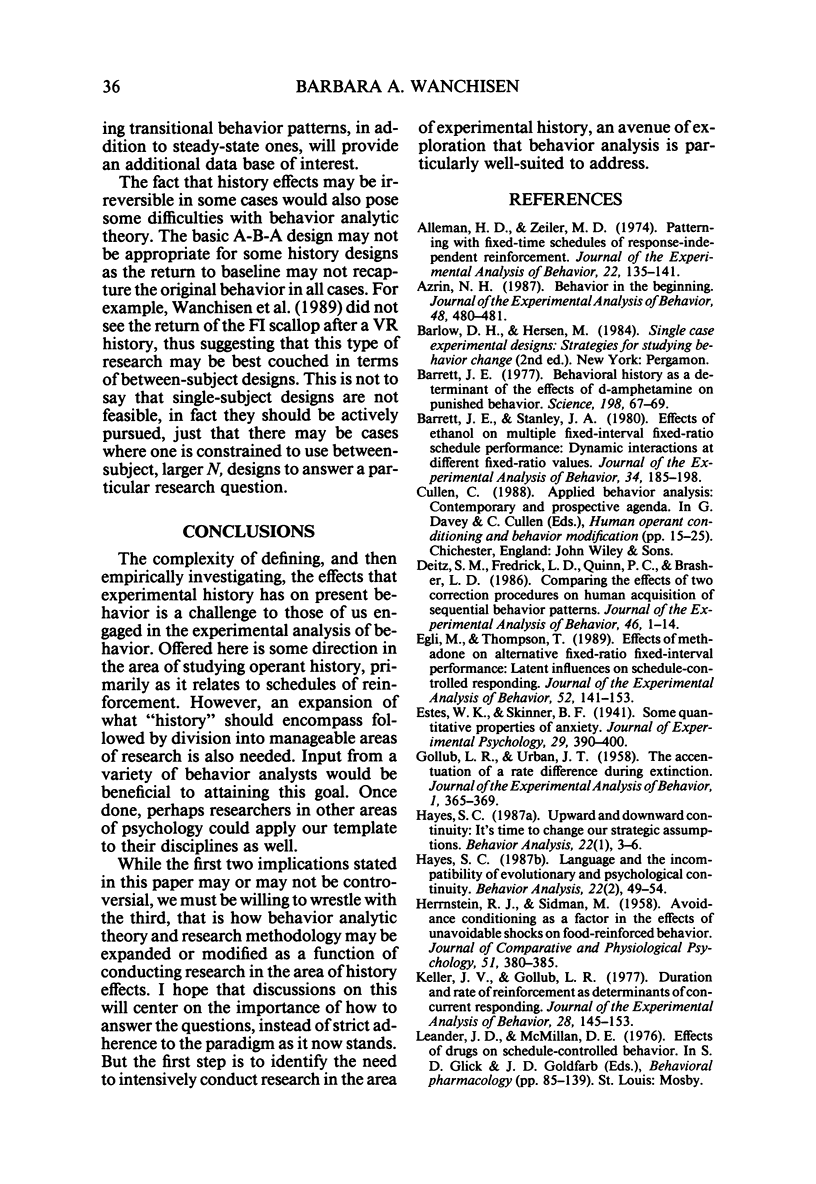
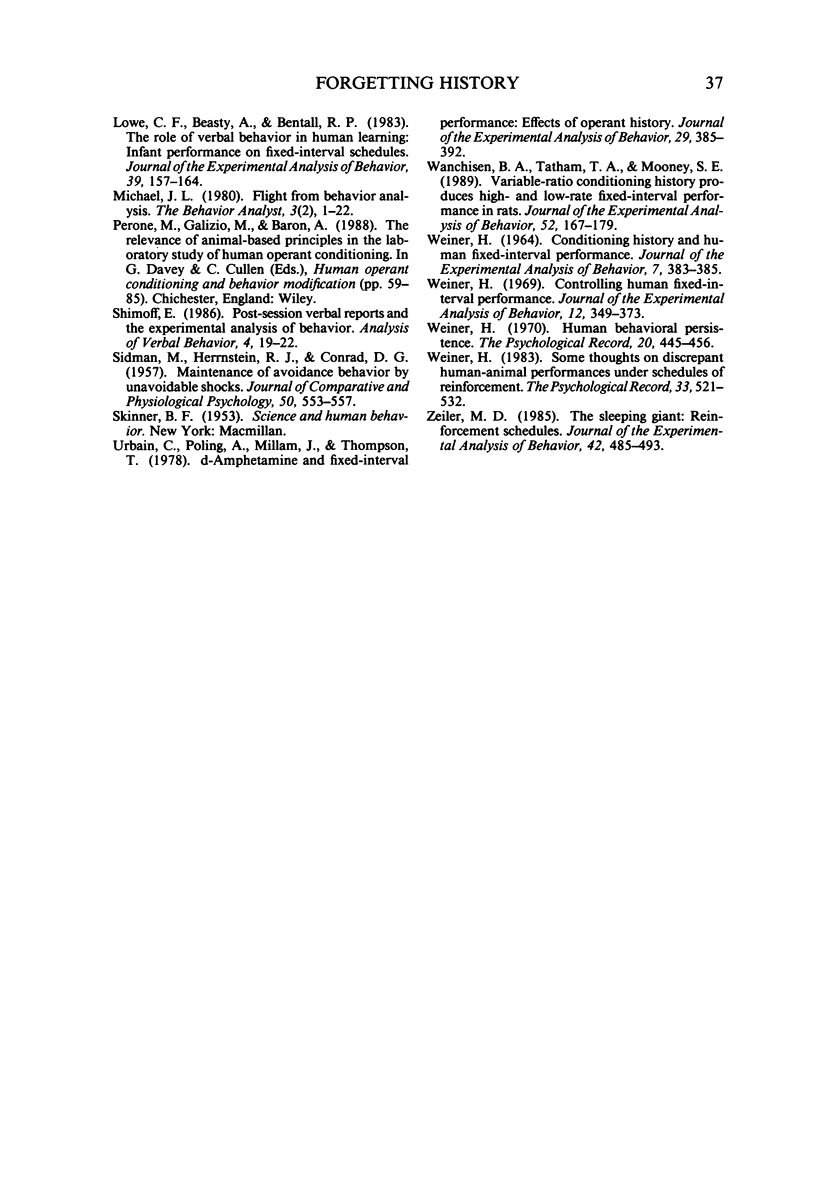
Selected References
These references are in PubMed. This may not be the complete list of references from this article.
- Alleman H. D., Zeiler M. D. Patterning with fixed-time schedules of response-independent reinforcement. J Exp Anal Behav. 1974 Jul;22(1):135–141. doi: 10.1901/jeab.1974.22-135. [DOI] [PMC free article] [PubMed] [Google Scholar]
- Barrett J. E. Behavioral history as a determinant of the effects of d-amphetamine on punished behavior. Science. 1977 Oct 7;198(4312):67–69. doi: 10.1126/science.408925. [DOI] [PubMed] [Google Scholar]
- Barrett J. E., Stanley J. A. Effects of ethanol on multiple fixed-interval fixed-ratio schedule performances: dynamic interactions at different fixed-ratio values. J Exp Anal Behav. 1980 Sep;34(2):185–198. doi: 10.1901/jeab.1980.34-185. [DOI] [PMC free article] [PubMed] [Google Scholar]
- Deitz S. M., Fredrick L. D., Quinn P. C., Brasher L. D. Comparing the effects of two correction procedures on human acquisition of sequential behavior patterns. J Exp Anal Behav. 1986 Jul;46(1):1–14. doi: 10.1901/jeab.1986.46-1. [DOI] [PMC free article] [PubMed] [Google Scholar]
- Egli M., Thompson T. Effects of methadone on alternative fixed-ratio fixed-interval performance: latent influences on schedule-controlled responding. J Exp Anal Behav. 1989 Sep;52(2):141–153. doi: 10.1901/jeab.1989.52-141. [DOI] [PMC free article] [PubMed] [Google Scholar]
- Gollub L. R., Urban J. T. The accentuation of a rate difference during extinction. J Exp Anal Behav. 1958 Oct;1(4):365–369. doi: 10.1901/jeab.1958.1-365. [DOI] [PMC free article] [PubMed] [Google Scholar]
- HERRNSTEIN R. J., SIDMAN M. Avoidance conditioning as a factor in the effects of unavoidable shocks on food-reinforced behavior. J Comp Physiol Psychol. 1958 Jun;51(3):380–385. doi: 10.1037/h0038487. [DOI] [PubMed] [Google Scholar]
- Keller J. V., Gollub L. R. Duration and rate of reinforcement as determinants of concurrent responding. J Exp Anal Behav. 1977 Sep;28(2):145–153. doi: 10.1901/jeab.1977.28-145. [DOI] [PMC free article] [PubMed] [Google Scholar]
- Lowe C. F., Beasty A., Bentall R. P. The role of verbal behavior in human learning: infant performance on fixed-interval schedules. J Exp Anal Behav. 1983 Jan;39(1):157–164. doi: 10.1901/jeab.1983.39-157. [DOI] [PMC free article] [PubMed] [Google Scholar]
- Michael J. Flight from behavior analysis. Behav Anal. 1980 Fall;3(2):1–21. doi: 10.1007/BF03391838. [DOI] [PMC free article] [PubMed] [Google Scholar]
- SIDMAN M., HERRNSTEIN R. J., CONRAD D. G. Maintenance of avoidance behavior by unavoidable shocks. J Comp Physiol Psychol. 1957 Dec;50(6):553–557. doi: 10.1037/h0043500. [DOI] [PubMed] [Google Scholar]
- Urbain C., Poling A., Millam J., Thompson T. d-amphetamine and fixed-interval performance: effects of operant history. J Exp Anal Behav. 1978 May;29(3):385–392. doi: 10.1901/jeab.1978.29-385. [DOI] [PMC free article] [PubMed] [Google Scholar]
- WEINER H. CONDITIONING HISTORY AND HUMAN FIXED-INTERVAL PERFORMANCE. J Exp Anal Behav. 1964 Sep;7:383–385. doi: 10.1901/jeab.1964.7-383. [DOI] [PMC free article] [PubMed] [Google Scholar]
- Wanchisen B. A., Tatham T. A., Mooney S. E. Variable-ratio conditioning history produces high- and low-rate fixed-interval performance in rats. J Exp Anal Behav. 1989 Sep;52(2):167–179. doi: 10.1901/jeab.1989.52-167. [DOI] [PMC free article] [PubMed] [Google Scholar]
- Weiner H. Controlling human fixed-interval performance. J Exp Anal Behav. 1969 May;12(3):349–373. doi: 10.1901/jeab.1969.12-349. [DOI] [PMC free article] [PubMed] [Google Scholar]
- Zeiler M. D. The sleeping giant: Reinforcement schedules. J Exp Anal Behav. 1984 Nov;42(3):485–493. doi: 10.1901/jeab.1984.42-485. [DOI] [PMC free article] [PubMed] [Google Scholar]


